Chicago police and members of the U.S. Marshals Service tracked down the 35-year-old suspect earlier this week in St. Louis.
5 Things Retailers Should Know About the Stimulus Bill
The CARES Act will provide $2 trillion in aid to keep businesses afloat during the coronavirus pandemic.

New York—The Coronavirus Aid, Relief, and Economic Security Act (CARES Act) was signed into law Friday by President Donald Trump, providing $2 trillion in aid.
The 880-page act lays out a variety of provisions aimed at keeping individuals and businesses afloat as the U.S. navigates the coronavirus pandemic.
Here are five measures that could benefit retailers.
Tax provisions may allow retailers to retain employees and offset costs.
Tax code can be a tricky subject, so National Jeweler consulted Major Gen. Tim Haake, an attorney in the Washington, D.C. office of international law firm Dentons with a background in taxation. Haake has a Master of Laws degree in taxation from Georgetown University Law Center.
He is also a principal at Haake & Associates, the consulting firm that lobbies in D.C. on behalf of Jewelers of America and its political action committee, JAPAC.
He said a major measure of the bill for retailers to keep in mind is the employee retention tax credit, which will make it easier for employers to hold onto their workers by providing a 50 percent refundable payroll tax credit.
Retailers are eligible if business has been fully or partially suspended as a result of a government order, or if the business has experienced a 50 percent decline in gross receipts.
Something jewelers in particular may want to take note of, said Haake, is the $15 billion in funds available to retailers that took on remodeling projects during 2018 and 2019, available in the form of tax refunds.
As a result of a glitch in the 2017 tax reform law, affected companies overpaid federal taxes over the past two years.
Collection of federal payroll taxes is delayed until 2021, with 50 percent due then and 50 percent in 2022.
Deductions for interest paid on business loans also have expanded.
In addition, net operating loss carryback has been restored for tax years 2018-2020, which means companies will be able to carry back losses to profitable years up to five years prior and obtain refunds.
Haake broke down the basics of how this works.
For example, let’s say a retailer is not making a profit as a result of the impact of the coronavirus, but did make a profit in the last five years.
The provision allows retailers to go back to a year in which they made a profit and paid a tax and receive a refund for some of the tax paid.
There are some technical exceptions if averaging
Jewelers should consult their corporate attorney, certified public account and payroll company (if they use one) to help them decode CARES.
It may seem complicated, but actually, the act was “crafted in a way to eliminate technicalities and get money out there quickly,” said Haake.
Access to loans for small businesses has been expanded.
The Small Business Administration (SBA) set up a $350 billion Paycheck Protection Program that offers forgivable loans to cover up to 250 percent of payroll for small businesses with 500 or fewer employees.
In addition, the Federal Reserve, backed by the Federal Reserve Act, has the power to buy debt or extend loans to businesses of all sizes in extenuating circumstances, with the approval of the Treasury.
The regulatory body will do just that, receiving $500 billion to support credit facilities and leveraging that to provide more than $4.5 trillion in support.
More details on Federal Reserve credit programs will be available in the coming days.
In addition, Economic Injury Disaster Loans from the SBA are available to businesses with fewer than 500 employees and, now, also to sole proprietors and Employee Stock Ownership Plans, a type of company that sets up an employee stock ownership trust.
There is also a new emergency grant available allowing a business that has applied for a disaster loan to get an immediate advance of up to $10,000, which can be used for payroll purposes.
The advance is not required to be repaid, even if the request for a loan is denied.
Unemployment benefits have been expanded.
The CARES Act expands unemployment benefits, including to those who are self-employed and to independent contractors.
Individuals qualify for unemployment if they are able or available to work, but cannot for reasons related to COVID-19.
Coronavirus-related reasons include school closures, caring for a sick family member, or if their place of employment is closed or can’t be reached, like if a stay-in-place order is in effect.
The coverage applies to those unable to work for coronavirus-related reasons beginning on or after Jan. 27 and ending on or before Dec. 31, 2020.
Individuals who qualify for unemployment will receive an additional $600 on top of the amount given by the state in which they reside.
The plan, known as the Federal Pandemic Unemployment Compensation program, will provide unemployment insurance for 39 weeks, an extension on the standard 26 weeks.
Payments will be made available from the first week of unemployment, eliminating the usual one-week delay.
Individuals will receive a one-time check.
Checks start at $1,200 and go up or down from there, depending on how much individuals earn and how many dependent children they have.
Individuals making $99,000 or above and couples making $198,000 and above who have no dependent children will not receive a check.
An individual’s income will be determined using 2019 tax returns or 2018 returns if the taxpayer hasn’t filed their 2019 taxes yet.
There are a number of calculators available online to help people determine how much they will get, like this one from H&R Block.
There are resources available to individuals and retailers in need of guidance.
The CARES Act is a lengthy one with a long list of provisions and complicated exceptions.
But, “life is complicated,” said Haake. “Rely on whoever has advised [you] over the years in terms of how to take advantage of these provisions.”
Jewelers of America, which owns National Jeweler, compiled a resource guide breaking down the provisions and highlighting especially important information.
“We’ve been trying to provide members and the industry with the best information we have on hand,” CEO David Bonaparte said in an interview with National Jeweler.
He encouraged jewelers to reach out to the industry’s trade organizations with any questions and, more importantly, to stay on top of things.
“Don’t shutter and wait for this to go away. Stay active in the marketplace,” he said, advising jewelers to keep in touch with customers and vendors, and their banks.
The National Retail Federation also provided an overview of the bill on its blog.
The Small Business Administration put together a list with guidance for small businesses and loan resources.
The SBA is reachable on a local level as well, with 68 district offices, and works alongside resource partners.
The SCORE Association is a nonprofit comprised of more than 13,000 business counselors volunteering to offer their services.
The Small Business Development Centers’ office is also available to support small businesses.
Women-owned small businesses can reach out to The Women’s Business Centers, and veterans can contact the Veterans Business Outreach Centers.
In addition, the Centers for Disease Control and Prevention has a guide available for businesses and employers.
The Latest

Owners of the Ekapa Mine reportedly filed for liquidation about a week after a mudslide trapped five workers who have yet to be found.

A 10-year alliance has also begun to address the shortage of bench jewelers through scholarships, enhanced programs, and updated equipment.

Every jeweler faces the same challenge: helping customers protect what they love. Here’s the solution designed for today’s jewelry business.
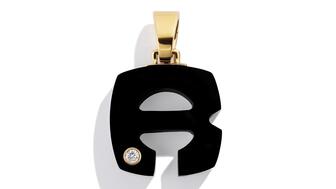
The “Splendente” collection has evolved to feature hardstone letter pendants, including our Piece of the Week, the onyx “R.”

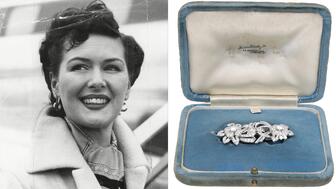
The jewelry collection belonged to “one of society's most glamorous and beautiful women of the mid-20th century,” said the auction house.

The update came as Anglo took its third write-down on the diamond miner and marketer, which lost more than $500 million in 2025.

With refreshed branding, a new website, updated courses, and a pathway for growth, DCA is dedicated to supporting retail staff development.

Emmanuel Raheb discusses the rise of “GEO” and the importance of having well-written, quality content on your website.
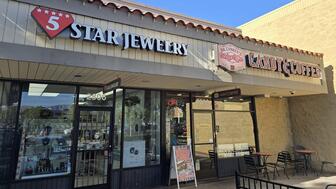
Each received around four years for burglarizing a jewelry store and a coffee shop in Simi Valley, California, last May.

Catherine Aulick, a GIA graduate, received the ninth and final Gianmaria Buccellati Foundation Award for Excellence in Jewelry Design.

We asked a jewelry historian, designer, bridal director, and wedding expert what’s trending in engagement rings. Here’s what they said.

Experts from India weigh in the politics, policies, and market dynamics for diamantaires to monitor in 2026 and beyond.

Beth Gerstein discusses the vibe of the new store, what customers want when fine jewelry shopping today, and the details of “Date Night.”

Are arm bands poised to make a comeback? Has red-carpet jewelry become boring? Find out on the second episode of the “My Next Question” podcast.

The Swiss watchmaker is battling declining sales amid a rapid retail expansion, according to a Financial Times report.

The campaign celebrates Giustina Pavanello Rahaminov, the co-founder’s wife and matriarch of the family-owned brand, for her 88th birthday.

Rachel Bennett, a senior jeweler who has been with Borsheims since 2004, earned the award.

The industry veteran, who was with The Edge Retail Academy for 14 years, joins her husband at the company he founded in 2022.

The vintage signed jewelry retailer chose Miami due to growing client demand in the city and the greater Latin American region.

Former Flight Club executive Jin Lee will bring his experience from the sneaker world to the pre-owned watch marketplace.

Sakamoto, who died in mid-January following a sudden illness, is remembered for his humility and his masterful, architectural designs.

The April event will feature a new VIP shopping day requiring a special ticket.

Bulgari chose the British-Albanian singer-songwriter for her powerful and enduring voice in contemporary culture, the jeweler said.

Smith encourages salespeople to ask customers questions that elicit the release of oxytocin, the brain’s “feel-good” chemical.
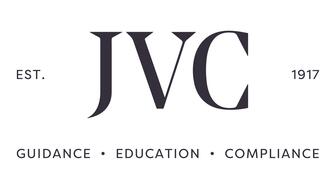
JVC also announced the election of five new board members.
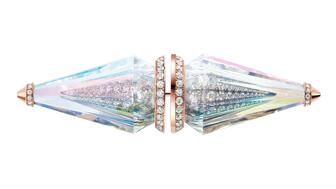
The brooch, our Piece of the Week, shows the chromatic spectrum through a holographic coating on rock crystal.




























